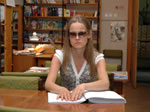
Sarmite Gromska is a 21-year-old blind student at the University of Latvia who is now taking advantage of free study materials in Braille made possible through the European Social Fund.
"I'm not sure I would like to be able to see. Being blind is part of who I am."
Blinded as a baby due to a tragic medical error, Sarmite Gromska has no memory of vision. Today, she finds it difficult even to imagine the experience.
"I was born prematurely, at about seven months, and then was placed in an incubator. That caused me to go blind. It was an accident, nothing more.”
"People don't always understand me when I say I wouldn’t like to see. If I could see I would lose a part of my identity. Being blind defines who I am."
Blindness - a 'truthful' vision of the world
Sarmite says her blindness also gives her a more 'truthful' vision of the world. "Appearance isn't everything," she explains. "I think I 'see' more clearly than the sighted. Most people pay attention to what they see with their eyes, but I see people's souls. I see their 'voice gestures', their intonations, and I feel how they touch me.
Living with her parents and two brothers in Riga, Sarmite is an inspiring example of how far one can get with determination and support. She spent her early years at a special boarding school for the blind, where she learned to read and write in Braille. Continuing her studies at the university, she distinguished herself as a student and was awarded a grant. She also has musical talent and played saxophone in a youth band. Although Sarmite still plays occasionally, she says she is leaving music for the moment to concentrate on university.
Study materials
Sarmite needs specialised equipment in order to study, and she is extremely proficient at writing with either a 'slate' or with a special Braille typewriter, as well as a computer fitted with voice-recognition software.
To get all her university course materials translated into Braille, she depends on the Latvian Library for the Blind. However, as Gunta Bite, the head of the Library’s Braille Department, explains, “Braille transcription is prohibitively expensive.
"We can only do this work in-house thanks to EU funding, which helped us to set up our Braille department. “The aim of the project was to provide blind and visually impaired people with a variety of services and materials, ultimately helping them to integrate into society and the labour market and to live more independent lives.
Access and success
The EU, through the European Social Fund, made it possible for the Library to acquire equipment and training so that it could start to print books and other documents for the blind. Braille readers from across Latvia now have access to a whole new range of reading materials, free of charge. And they can request specific texts when they have the need.
Today, the department also employs blind and visually impaired people to work in the preparation of texts. "It was working for the Library one summer that convinced me I wanted to be a Braille editor," explains Sarmite, a career she is now working towards at university.
For most of her life, Sarmite has been completely dependant on her parents. Indeed, the story of Madame Gromska, Sarmite's mother, is a case study in itself in courage, determination and lifelong devotion to her child.”
But Sarmite knows one day she'll be alone and will have to stand on her own feet. "Yes, I was nervous about starting university," she says. "It was a major step to take, both on an academic level and on a personal level. I'm still very dependant on other people and especially my family, but I have to learn to be strong and to survive.”
"The Braille library has made a big difference in my life and, I know, in the lives of other blind people. I've definitely gained a lot from the European Social Fund project. Being able to print out all the materials I need for my studies means I can continue the process of growing, moving forward and becoming a productive member of society."
